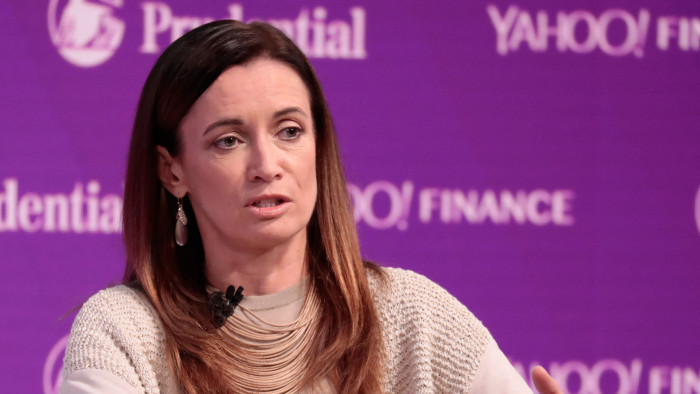Blockchain: disillusionment descends on financial services


Roula Khalaf, Editor of the FT, selects her favourite stories in this weekly newsletter.
Blockchain was going to make banks irrelevant and allow the world to “be [its] own bank”. Then, it was going to help those very same banks save tens of billions of dollars a year in infrastructure costs, transform the way they process transactions, and create new revenue streams. Some even claimed it would be bigger than the internet.
But despite a great deal of excitement — and an even greater number of press releases — the technology has not lived up to its promise and there are signs the hype is fading.
Blockchain is the technology that underpins cryptocurrencies like bitcoin. It is, in effect, a database system that records and processes transactions via a distributed network of computers, with no need for a centralised entity to verify them.
At various points since its inception more than a decade ago, enthusiasts have claimed that blockchain could replace central banks, wipe out post-trade intermediaries like clearing houses, and become the backbone of cross-border payments. (And that is just in banking — outside the financial sector the claims become even more grandiose, with the technology purportedly having potential to cure cancer and bring about world peace.)
The financial services sector has ploughed huge amounts of money into blockchain, totalling some $1.7bn a year, according to research firm Greenwich Associates. And yet, so far, beyond the wild and volatile world of cryptocurrencies, blockchain has had little to no discernible impact.
Germany’s Bundesbank spent two years working with Deutsche Börse building prototypes for blockchain-based securities settlement. Yet earlier this year, the president of the central bank Jens Weidmann said “a real breakthrough in application is missing so far”.
Outside of blockchain, the broader world of fintech has started to have a real impact on the financial sector, forcing banks and other firms to bring their technology — and their user experience, in particular — into the twenty-first century.
One of blockchain’s biggest problems is that it was approached badly. Rather than beginning with the challenges banks were trying to solve and then seeing whether blockchain could be applied to them, too many projects started with the technology, tried to discern how to make money from it, and worked from there.
“Blockchain’s failed promises could be a mandatory class in business school for how not to build a sustainable organisation,” says Tim Swanson, head of market intelligence at blockchain company Clearmatics. He adds that, in most cases, entrepreneurs have just recast the same market, but with their technology the centre.
Now, a degree of disillusionment has set in. A couple of years ago, when cryptocurrencies were booming, blockchain panels at fintech summits and other financial conferences were packed to the rafters, but these days they attract smaller crowds.
“The hype of the last few years, followed by the disappointment that many people are feeling now, is evidence that you need to understand the problems that need to be solved and then look for an answer, rather than throwing a technology at business problems before you’ve understood them,” says Martin Walker, director for banking and finance at the Center for Evidence-Based Management.
Now, what Mr Walker calls “blockchain fatigue” has also chipped away at the PR value that the word once bestowed on any company that attached itself to the technology.
Digital Asset Holdings, for example, was once considered a leading player — with its former chief executive Blythe Masters seen as a flag-bearer for the technology. It had planned to transform the world of securities settlement, but has since pivoted away from blockchain. Instead, it is focusing on “smart contracts”, a kind of computer programming function that does not require blockchain to work.

Digital Asset Holdings now talks about “distributed ledger technology”, or DLT, rather than blockchain. The terms are often used interchangeably, but Colin Platt, an independent cryptocurrency and DLT consultant who previously worked on blockchain projects at French banking group BNP Paribas, says there is a key difference: in a blockchain, everyone on the network can see all the transactions, whereas with DLT that is not necessarily the case.
Weekly newsletter

For the latest news and views on fintech from the FT’s network of correspondents around the world, sign up to our weekly newsletter #fintechFT
For Mr Platt, while there is not much use for blockchain in the world of finance — even a so-called “permissioned blockchain”, where the number or parties who are allowed on to the network is limited — there could be some uses for DLT, such as for interest rate swaps and other derivatives, because they do not have one obvious trading centre. But, he adds, these new tools will not come quickly and are unlikely to be earth-shattering.
“I don’t believe that I’ve ever seen a case where a blockchain — that shares everything with everyone — in a permissioned sense was justified,” he says. “But I’d argue [that] for the things that may need a DLT, we haven’t given it enough time.”
For now, DLT has yet to prove itself and blockchain’s graduation into the mainstream remains a pipe dream. Even if you could use blockchain to run some banking processes, there is usually a better, quicker, cheaper and more efficient way to do so.
“It’s not so much what’s wrong with the technology, it’s just that the tool has to fit the problem,” Mr Walker says.
“Would you try to open a can of beans with a sledge hammer, or a machine gun? You could do it, but would you want to?”
Letter in response to this article:
The intermediary is still providing genuine value / From Robert Shooter, London, UK

Comments